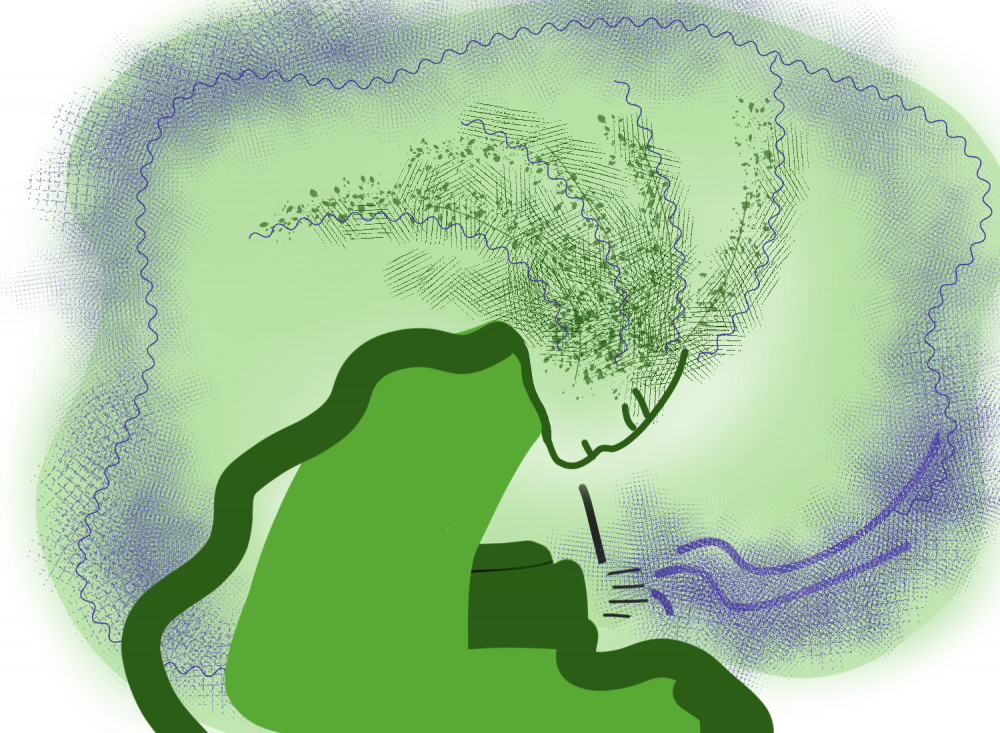
August 9, 2024
Fresh Ink: The Defeat of Thought by Osamu Dazai
Japan’s literary legend’s never-before translated work
All of the articles in our Fresh Ink series highlight the English-language debuts of never-before-translated works of prominent Japanese writers.
Osamu Dazai is one of Japan’s literary legends: a tormented and embittered man who drowned himself in the Tamagawa Canal, but who lived on to inspire generations with his earthy, all-too-honest style and gut-wrenching plots. He wrote a number of tiny, fragmentary stories in newspapers and magazines over the course of his life, which have been extensively cataloged and uploaded in the public domain at Aozora Bunko.
“The Defeat of Thought” is a dizzyingly bizarre and experimental piece. It also offers unparalleled insight into Dazai’s fragmented consciousness, his approach to writing, and his way of thought and worldview that underpins his twisted stories. Strangely, in some way, it is not so different from his other works: the desperate, compulsive desire to love and create art is assaulted and pinned down by agonies and miseries from every direction. Surrender your expectations for a logical story, and instead embrace the strangeness of a trip into the mind of one of Japan’s finest authors ever.
The Defeat of Thought
Translated by Eric Margolis
There is a phrase that goes, “tell the truth to a different world.” There may be no way to prove that true love exists, not between person and person, not in this world. But loving a person is not, certainly not, a matter of discussion. Only God can love well. Is that the truth?
Everyone gets it. Your loneliness, everyone, they get it. But is my supposition arrogance, an arrogance all my own? I can say nothing.
At the celebratory dinner for the publication of Takao Nakatani’s Spring Scrolls, Mr. Ibuse gave the congratulatory address. He spoke softly. “For an excellent author to be recognized as an excellent author, it is, yes, no small matter…” His voice trembled as he spoke.
Sometimes, in order to just write a bit, I have to write and write, quite a bit. Of gobbledygook.
Immanuel Kant was the one who bestowed upon me my conception of gobbledygook. That is to say, pure gobbledygook.
Out of the blue, I recall the term dandyism, with its root, of course, being the word dandy, accompanied by no small palpitation of the heart. But a trip into my meager English-Japanese dictionary reveals little more. Oh, how I long to have the oomph of a dandy. No, but I must have it. I must, and you must, too.
Us humans, we cannot save one another. Is that the truth?
What shall I write? How about this sentence: “Love, it does exist in this world. It does, it must. But what cannot be found is the expression of love. Nor its means of production.”
Weeping and wailing, the X-ray said, “I can only see your stomach and your spine, not your pale skin. I am blind and I am sad.” But that line’s a freebie for my readers. Worthy authors, we are quite busy.
The lewdness of Jean-Jacques Rousseau’s Confessions lies not in the God of the reader (who was it? Did I write about Him already?), but the reader’s neighbor. The reader down the street. Consider the confessions of Rousseau alongside Augustine’s, and the former looks all the more vile. However, if the ultimate form of penitence that humans can attain is a wordless prostration in the Garden of Gethsemane, then even Augustine’s confessions are no more than vulgar hilarity. We are all doomed. We face the same fate as our words.
But we ought to rest easy. Rousseau, and Augustine too, are kind men. To the utmost best of their abilities, they strove to finish their work.
I, now, at this very moment, attempt to fool you. Why are Rousseau’s confessions more widely read than Augustine’s, and why is that so right?
The answer is brute boorishness. I swear this to you.
I have one assignment. “My novels and my confessions.”
I have to be strange, writing such sentences. An image appears before my eyes: the greengrocer’s boy, arms stiffly folded, preaching loudly to his bowl of hotpot some vague new knowledge he just learned from one of the customers. And yet, and still, I consider it. It’s not a bad scene, not half-bad.
What say you, eh? Once you chuckle once, it’s rather difficult to go back to a serious expression—so the inevitable outcome is to scoop up some water in your palms and get tickled by the itty-bitty tadpoles wriggling around, dizzied by the sensations even in your daunting pose.
I thought I might have a look back at the passages I’ve written so far, but no, I rather won’t (I’m not laughing anymore). Four or five days ago, a friend of mine passed away, so I suppose I’ll write just a little about that. This friend meant a lot to me, so much to me. It’s difficult to admit, but I always felt inferior—he had a ‘be not defeated by the rain’ kind of charitable spirit. Then, without so much as a parting word, he passed. It’s almost shameful to me. The poverty of my love is so shameful. My own vanity towards my love for him is so shameful. He passed without even a word to his parents. I can scarcely imagine the shame his parents must feel, and the agony.
I face his spirit, and doth command: faced with the agony of incoming death, speak to thy mother. Speak ten times. Speak ten thousand times.
But even after speaking ten thousand times, if your mother remains stony and steadfast—but no, this is just ridiculous, it’s not the case and never the case, what am I straining at, parents and their children must force themselves to get along, everybody knows that. I must remember the limits of human power. I must speak the limits of my own power.
At this very moment, I continue to fool you, friend. But that’s because I do not want to let you die. I beg you, you, do not die. Summon blind love for yourself. When you die, your empty seat will always exist at my side. Its cushion, indented ever-so-softly with the weight of your life, will always remain beside me. That cold seat, without any trace of life, will live on as your vacant seat, forevermore. Even God cannot occupy it. Yes, my love, my blind and writhing love—ah, if only it weren’t so—looks exactly like my own ego.
But we take steps through life. That is to say, we cannot help but to love. I felt it all: everyone’s kindness, everyone’s agony, everyone’s loneliness, but it seems that there is no word for “the other” in my dictionary. So it does not matter who you are. You—yes, you—will die someday. Ah, yes, this deluge of slovenly love. What, who, am I? “A sentimentalist.” Hm, you’re not wrong.
This spring, my wife and I separated, and since then, I have loved, one time. That woman, she rejected me, saying, “Darling, you are too good for the likes of me.” I hastily composed a heartbroken poem. Since then, I’ve stayed away from women.
There is…nothing. So I should lose…nothing. Is today my true departure? (Bitter laughter.)
Laughter. How powerful! The fruit of culture is fireworks! No matter what, the pinnacle of human understanding—of intellect, of reasoning, of mathematics—ends with hysterical laughter. And if that is the truth, yes, if that is truth, the knowledge of humankind—why, precisely because I adore it—is simply hilarious.
It is us artists who care most about the dirt on the ground.
And now that I’ve reached the promised number of pages, I will put down my pen, and as I peel a pear, I will think with bitter brine, “this is all I could have done.”







